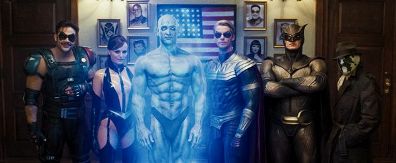There was a movie man,
Who had a movie plan,
And adapted a comic quite florid.
When it was good,
It was very good indeed,
But when it was bad it was horrid.
About halfway through Zack Snyder’s Watchmen, the everyman ex-superhero Dan Dreiberg and the restless superwoman-legacy Laurie Jupiter have a fumbling, awkward attempt at sex. It’s painfully real, and from the reflection of his glasses to the squeaky, sagging couch, it brings the scene in the comic to life and highlights the tenuous connection between two lonely people at a dead end in their lives.
Less than twenty minutes later, as Leonard Cohen’s “Hallelujah” blares obnoxiously over the soundtrack, Dan and Laurie engage in a bout of tantric sex for so long that even the hysterical laughter of the audience eventually gave way to embarrassed silence as the two rode each other like a carnival kiddie coaster. Whether it was meant as homage to the comic, an arousing love scene, or an ironic joke, the scene did nothing but make us wish the film would burn through.
Sitting through the full length of Watchmen means following the film through a series of similar peaks and valleys; a more uneven movie I have rarely seen, with moments of lyricism standing alongside moments so overwrought or badly managed that the theatre fills with derisive laughter.
Strangely, there is no point in which Snyder may either take full blame or rest on his laurels; every element of the film is hit or miss. The largely-stellar casting (Jackie Earle Haley, Jeffrey Dean Morgan, Billy Crudup, Matthew Goode, Patrick Wilson) suffers from a talent suck (Malin Ackerman) who manages to make anyone in a scene with her look like an Our Town understudy. The film-school-freshman music direction (minus the unsubtle but appropriate “The Times They Are a-Changin'” over the opening montage) fobs one classic-rock hit after another with such relentlessness that by the time the scoring appears like a guest late to the party, we’ve wasted an hour gritting our teeth anticipating the next onslaught of classic rock.
Dear Mr. Snyder; we know it’s 1985—playing “99 Luftballons” is not necessary. Ever.
The script, adapted in good faith from Alan Moore’s graphic novel, sinks or swims entirely on the shoulders of the actors in the frame. Snyder, who seems far less interested in characters than in framing his slo-mo just so, leaves it up to the actors to do as they will. The better actors manage to work between the lines, adding deft moments of characterization that strengthen the implied relationships between old friends and enemies. Malin Ackerman, on the other hand, delivers her lines with all the flair of dry seaweed. Pity the man stuck in a frame beside her.
Visually, the film is stunning; whatever his flaws, Snyder knows how to compose a shot. As anyone who has seen 300 could comfortably suspect, fight scenes are polished and either lightning-fast or underwater-slow, and once or twice the action rises to moments of true elation and suspense, even for those who know the outcome.
There are small but significant plot changes, unavoidable in any adaptation, that will upset purists. While the third act will manage to surprise casual and hardcore fans alike, it’s the smaller, less sweeping changes that chip away at the movie’s tone, and do it the largest disservice. In faithfully bringing the comic panels to life, Snyder sometimes neglects the atmosphere and tone that elevated Moore’s underbelly superheroes into anti-archetypes; luckily, comic books fans are used to not getting their cake and eating it, too.
Verdict: Watchmen is recommended for those who don’t mind wildly varying quality; bring your own pearls to clutch.










